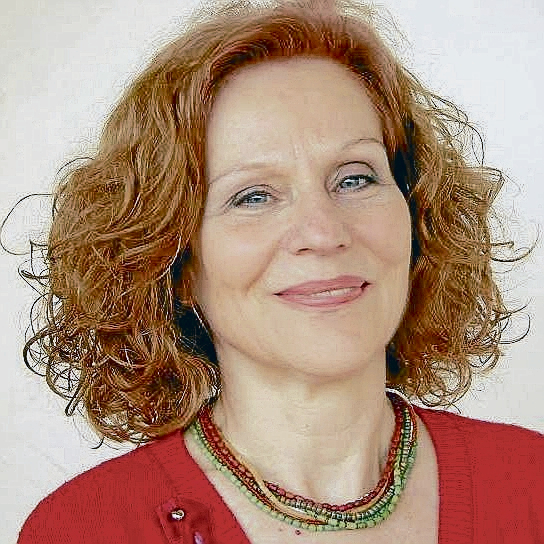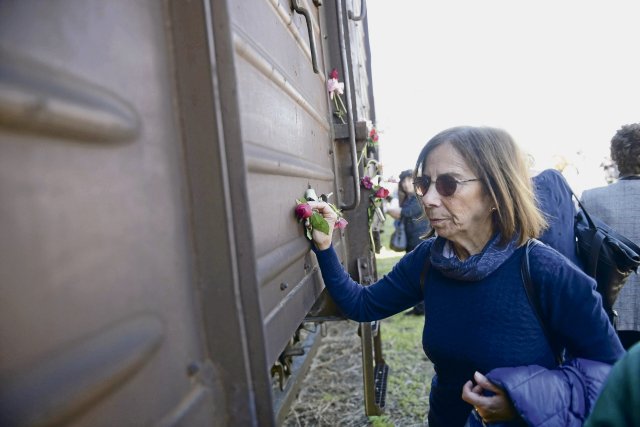In memory of the Jewish victims of the deportation from Thessaloniki to the Nazi concentration camps, numerous citizens come to the train station every year (here on March 17, 2019).
Photo: Giannis Papanikos
Elena Chouzouri, your novel, published in Greek in 2016 and now translated into German, is very complex, deals with the destruction of the Jewish community in Thessaloniki, the horror of the German occupiers, but is also dedicated to the Jewish resistance in the mountains and the civil war after the liberation and its effects up to our days. What aspect do you think is most important in the novel?
The most interesting thing for me was how the Jewish community in Thessaloniki lived before the Holocaust. But of course the Holocaust shocked me enormously. I’m not Jewish, but to understand that, to understand people’s psychology, it took a lot of energy for me.
The novel acts like a parable of human unhappiness. Not only German soldiers, bureaucrats and commanders became perpetrators, but also civilian profiteers in Greece who enriched themselves from the property of Jews. The title of the novel “Uncle Avraam Stays Here Forever” is reminiscent of the great idealist and founder of the Socialist Workers’ Federation, Avraam Benaroya. However, in the novel he only appears peripherally. Why?
The title has three meanings. On the one hand, there is Abraham from the Bible, who is the progenitor of the Jewish people. Then there is Avraam Benaroya, Thessaloniki-born great idealist, anarchist, socialist, co-founder of the Communist Party of Greece…
Interview

facebook /elena Chouzouri
The Greek writer Elena Chouzouri, born in Thessaloniki in 1952, comes to Germany for two readings. She is presenting her novel “Uncle Avraam Stays Here Forever” in Leipzig (November 30th) and Berlin (December 1st). It is about the fate of the Greek Jews of Sephardic origin in Thessaloniki, who have lived in the city since 1493. The city was once referred to as the “Jerusalem of the Balkans”. German occupying soldiers put an end to this. The Jewish cemetery in Athens lists the number of Jews murdered under the German occupation in Thessaloniki: 56,000, which was 96 percent of the Jewish community. Stefan Berkholz spoke to her in Athens.
But he wasn’t loyal to the line. He also found himself in danger among comrades.
Yes, he was not loyal to the party and was expelled from the party. Under the Nazi occupation he was deported to the Bergen-Belsen concentration camp as a Jew and a communist. Even after the Second World War, the Greek communists were persecuted, this time by their own compatriots, the colonels. Benaroya, who had been close friends with David Ben-Gurion, the later co-founder of the Jewish state, since the beginning of the 20th century, went to Israel in the early 1950s. He died there, impoverished, in 1979 at the age of 92.
What role does this Benaroya play in your novel?
For me, this historical figure was the key to the story. Because Alisa, the student and the main character of my novel, is writing a doctoral thesis about this Avraam Benaroya. She goes from Israel to Thessaloniki in search of her uncle, this same Avraam Benaroya. And little by little she uncovers the truth behind the silence.
This becomes an exciting search for clues, because a lot of things have disappeared and been destroyed, the street names have been changed, the places have been flattened, and there is a great silence about the crimes. And the third meaning?
That is the most important to me. The history of the Jews of Thessaloniki will always remain. What happened is forever etched in Thessaloniki’s history. So Uncle Abraham will always live there.
nd.Kompakt – our daily newsletter

Our daily newsletter nd.Compact brings order to the news madness. Every day you will receive an overview of the most exciting stories from the world editorial staff. Get your free subscription here.
Something like a symbol of Thessaloniki’s lost spirit?
If you want, yes.
You yourself were born in Thessaloniki in 1952, worked as a journalist for many years and supervised book programs on television. You have now published several volumes of poetry, essays and five novels. Especially historical material.
Yes, for example “Dark Vardar”, a novel that has a certain relationship to “Uncle Avraam”. A story about Thessaloniki up to 1912, when it was still under Ottoman rule. “Dark Vardar” is about those people whose lives were radically turned upside down because of the Balkan Wars. The themes in this novel are also: expulsion, flight, loss, the consequences of war. And “Uncle Avraam” builds on this in a certain way, because the novel begins in 1912.
Her novel “The Lying Sun of Children” was published in Germany in 2014. A story about migration and home.
The original title is: “Home made of cotton”. It’s about the heroes in the liberation war who fought in the democratic army, i.e. after the Second World War. Defeated by the British in August 1949, the Greek soldiers had to flee to Albania. 12,000 came to Tashkent in the Soviet Union. The largest exile community of political refugees emerged there. They had no rights, no ID, and had to assimilate. They had found a peaceful home in Uzbekistan with its cotton production, but remained strangers.
Are there any autobiographical references in it?
Yes, the book is based on the story of my uncle, who was a doctor in the Democratic Army. After 1974, many of these exiles returned to Greece. And then the question was: What is home? They spoke and still speak Russian among themselves, they watch Russian television and of course they also vote for the communist party, the KKE.
Elena Chouzouri: Uncle Avraam stays here forever. A.d. Greek. v. Michaela Prinzinger. Publisher of the Greece newspaper, 214 pages, hardcover, €19.80.
Book presentation with the author on November 30th. in Leipzig, Ariowitsch-Haus cultural and meeting center, Hinrichsenstraße 14, 7 p.m. and on December 1st. in Berlin, Free University, Habel Schwertter Allee 45 in Dahlem, 7 p.m.
sbobet88 judi bola online judi bola online link sbobet
